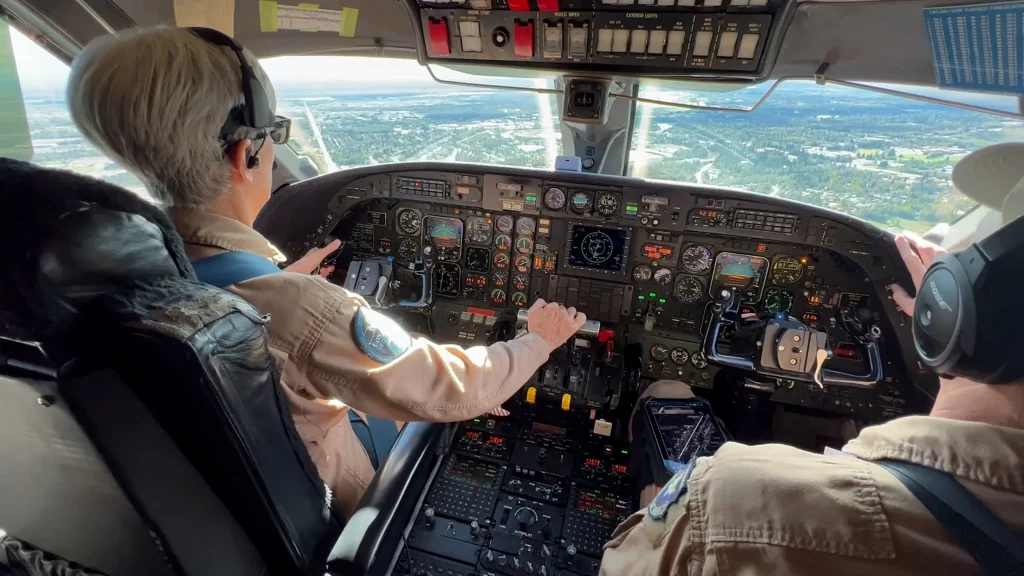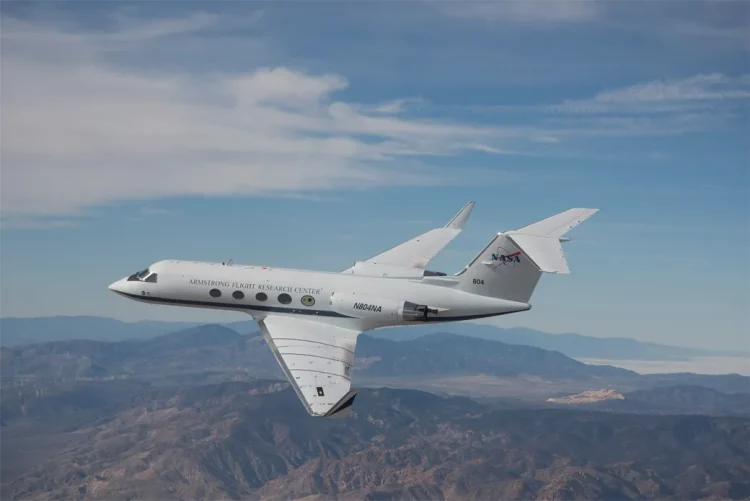Introduction
NASA’s commitment to advancing scientific knowledge and exploration extends beyond the boundaries of space, reaching into the heart of Earth’s atmosphere and environment. One such significant event occurred recently in Alaska, where NASA invited media representatives to witness firsthand the groundbreaking work being conducted by scientists aboard a research plane. This article delves into the details of this notable event, highlighting the objectives of the research, the technology employed, and the broader implications of the findings.
Event Overview: A Unique Opportunity for Media Coverage
1. Purpose and Objectives
The media event held in Alaska provided a rare and valuable opportunity for journalists and reporters to engage directly with NASA scientists and observe their work in action. The event was designed to showcase NASA’s cutting-edge research and technology, as well as to provide insights into the scientific processes and objectives behind the mission.
A. Promoting Public Awareness
- Educational Outreach: The event aimed to educate the public about NASA’s research initiatives and the scientific goals behind the mission. By providing media access, NASA sought to enhance public understanding and appreciation of its work.
- Highlighting Innovations: The event showcased the advanced technologies and methodologies used in NASA’s research, illustrating the agency’s commitment to innovation and excellence.
B. Facilitating Media Engagement
- Interactive Sessions: Media representatives had the opportunity to participate in interactive sessions with NASA scientists, asking questions and gaining insights into the research process.
- On-Site Observations: Journalists were able to witness the research plane in action, providing them with a unique perspective on the operational aspects of the mission.
2. The Research Plane: Technology and Capabilities
The centerpiece of the event was NASA’s research plane, equipped with state-of-the-art technology designed to conduct high-precision scientific measurements and observations. The plane played a crucial role in collecting data for various research objectives, including atmospheric studies and environmental monitoring.
A. Aircraft Specifications
- Advanced Instrumentation: The research plane was equipped with a range of advanced instruments and sensors, including spectrometers, lidar systems, and radar. These tools enabled the collection of detailed data on atmospheric conditions, environmental parameters, and other scientific variables.
- High-Altitude Capabilities: Designed for high-altitude operations, the plane could reach and maintain the necessary altitudes for collecting data on atmospheric layers and phenomena. This capability was essential for conducting research in remote and challenging environments.
B. Mission Objectives
- Atmospheric Research: One of the primary objectives of the mission was to study atmospheric composition and dynamics. The data collected helped scientists understand the behavior of atmospheric gases, aerosols, and pollutants.
- Environmental Monitoring: The plane also conducted environmental monitoring, including the assessment of climate change impacts, pollution levels, and natural phenomena such as wildfires and volcanic eruptions.

The Research Mission: Goals and Methodology
1. Scientific Goals
The research mission in Alaska focused on several key scientific goals, each contributing to a broader understanding of atmospheric and environmental processes. These goals included:
A. Studying Atmospheric Composition
- Gas Measurements: The research plane collected data on the concentration of greenhouse gases, such as carbon dioxide and methane, as well as other atmospheric components. Understanding these measurements is crucial for assessing climate change and air quality.
- Aerosol Analysis: By analyzing aerosol particles in the atmosphere, scientists gained insights into their sources, distribution, and effects on climate and air quality. Aerosols play a significant role in atmospheric processes and have implications for health and environmental conditions.
B. Monitoring Environmental Changes
- Climate Change Effects: The research aimed to document and analyze the effects of climate change on Arctic and sub-Arctic environments. This included studying changes in ice cover, vegetation patterns, and permafrost conditions.
- Natural Disasters: The plane’s instruments were used to monitor natural disasters such as wildfires and volcanic eruptions. Understanding the impacts of these events on the environment and atmosphere is essential for developing effective response strategies.
2. Methodology and Data Collection
The methodology employed during the mission involved a combination of in-flight measurements, remote sensing, and ground-based observations.
A. In-Flight Measurements
- Real-Time Data Collection: The research plane collected real-time data on atmospheric parameters, including temperature, pressure, humidity, and gas concentrations. This data was transmitted to ground stations for immediate analysis.
- Sampling and Analysis: The plane’s instruments collected air samples at various altitudes, allowing scientists to analyze the composition and properties of the atmosphere. These samples were examined for their chemical and physical characteristics.
B. Remote Sensing
- Lidar and Radar Systems: Lidar and radar systems onboard the plane were used to remotely sense atmospheric layers and detect phenomena such as clouds, aerosols, and pollutants. These systems provided valuable data on the vertical distribution of atmospheric components.
- Spectroscopic Measurements: Spectroscopic instruments measured the absorption and scattering of light by atmospheric gases and particles. This data helped scientists identify and quantify specific components in the atmosphere.
C. Ground-Based Observations
- Collaborative Efforts: The research plane’s data was complemented by ground-based observations and measurements conducted by scientific teams in Alaska. This collaborative approach provided a comprehensive understanding of the research objectives.
The Broader Implications of the Research
1. Advancing Scientific Knowledge
The research conducted during the mission has significant implications for advancing scientific knowledge in several key areas:
A. Climate Science
- Improving Climate Models: The data collected on greenhouse gases and atmospheric composition contributes to improving climate models and predictions. Accurate climate models are essential for understanding and mitigating the impacts of climate change.
- Assessing Climate Change Impacts: By studying environmental changes in the Arctic and sub-Arctic regions, scientists gain insights into the effects of climate change on these vulnerable areas. This information is crucial for developing adaptation strategies and policies.
B. Environmental Monitoring
- Pollution Assessment: The research provides valuable information on pollution levels and sources, helping to identify areas of concern and inform regulatory measures. Understanding pollution dynamics is important for protecting air quality and public health.
- Disaster Response: The data on natural disasters such as wildfires and volcanic eruptions enhances our ability to respond to these events and assess their environmental impacts. Timely information is critical for effective disaster management and mitigation.
2. Enhancing Public Awareness and Engagement
A. Educational Impact
- Inspiring Future Scientists: The media event and research mission serve to inspire and engage the public, particularly students, in science and technology. By showcasing NASA’s work, the event encourages young people to pursue careers in STEM fields.
- Educational Resources: The data and findings from the research are often used to develop educational resources and outreach materials. These resources help to communicate scientific concepts and discoveries to a broader audience.
B. Public Understanding
- Building Trust: Transparent communication of NASA’s research activities helps build public trust and support for space exploration and scientific endeavors. Providing access to data and findings fosters a better understanding of the agency’s work and its relevance to everyday life.
- Engaging Media Coverage: Media coverage of NASA’s research events amplifies the reach of scientific findings and engages the public in discussions about important issues such as climate change and environmental protection.
Challenges and Future Directions
1. Overcoming Research Challenges
A. Technical and Logistical Issues
- Aircraft Maintenance: Ensuring the optimal performance of the research plane requires ongoing maintenance and technical support. Addressing any issues promptly is essential for the success of the mission.
- Data Management: Handling and analyzing the large volumes of data collected during the mission presents challenges. Advanced data management and processing techniques are needed to extract meaningful insights.
B. Environmental and Operational Constraints
- Weather Conditions: Research missions in remote and challenging environments, such as Alaska, are subject to unpredictable weather conditions. Planning and adapting to these conditions are crucial for successful data collection.
- Safety Considerations: Ensuring the safety of personnel and equipment during the mission is a top priority. Comprehensive safety protocols and risk assessments are essential for mitigating potential hazards.
2. Future Research Initiatives
A. Expanding Research Focus
- New Technologies: Future missions may incorporate new technologies and advanced instrumentation to further enhance data collection and analysis. Innovations in remote sensing, data processing, and simulation are expected to drive future research efforts.
- Broader Geographic Scope: Expanding research to additional regions and environments can provide a more comprehensive understanding of atmospheric and environmental processes. This includes exploring new areas and addressing emerging scientific questions.
B. Collaborative Efforts
- International Partnerships: Collaboration with international research organizations and agencies can enhance the scope and impact of scientific research. Joint missions and data sharing can lead to more comprehensive findings and solutions.
- Interdisciplinary Approaches: Combining expertise from various scientific disciplines can lead to a more holistic understanding of complex environmental and atmospheric issues. Interdisciplinary research efforts are likely to play a key role in addressing future challenges.
Conclusion
NASA’s recent media event in Alaska highlighted the agency’s ongoing commitment to advancing scientific research and public engagement. The research mission, conducted aboard a state-of-the-art research plane, provided valuable insights into atmospheric and environmental processes and showcased the innovative technologies used in the study.
By facilitating media access and promoting public awareness, NASA has reinforced its dedication to transparency and education. The findings from the mission have important implications for climate science, environmental monitoring, and public understanding of scientific issues.











































Discussion about this post